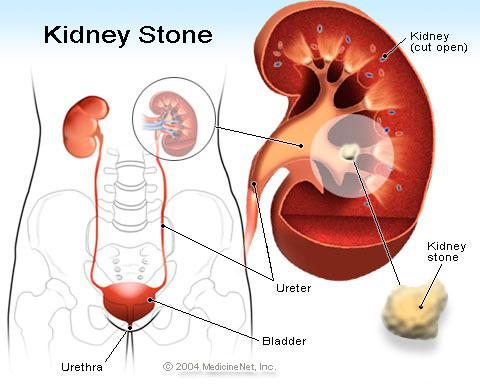Kidney Stones
Riverside urologist KEN TAKESITA, M.D. specializes in the minimally invasive treatment of kidney stones. Using the state of the art technology, our board-certified urologists have the specialized training and skills necessary to assist patients even with complex stones to become stone free with minimal impact on their daily lives. When choosing a urologist to treat kidney stones, it is highly recommended to seek urologists who specialize in kidney stone diagnosis and treatment to maximize your probability of a successful outcome and avoid the complications of kidney stone treatment. When it comes to improved outcomes following surgery for kidney stones, experience does matter. Please call Mission Urology today to schedule an appointment with one of our kidney stone treatment specialists.
WHAT ARE KIDNEY STONES (URINARY CALCULI)?
 Kidney stones (urinary calculi) are stones formed from concentrated levels of minerals typically found in the urine such as calcium and uric acid. If these minerals concentrate to high enough levels they will crystallize and accumulate into larger stone-like structures known as urinary calculi. They can form anywhere in the urinary tract from the kidneys down to the ureters and bladder. The most common type of stone is made up of calcium oxalate followed in order of decreasing frequency by uric acid, infectious stones known as "struvite" stones and cystine stones. Urinary calculi can range in size from just a few millimeters to several centimeters occupying the entire collecting system of the kidney. Kidney stones are responsible for a tremendous burden to society equaling billions of dollars a year in health care costs and missed work days.
Kidney stones (urinary calculi) are stones formed from concentrated levels of minerals typically found in the urine such as calcium and uric acid. If these minerals concentrate to high enough levels they will crystallize and accumulate into larger stone-like structures known as urinary calculi. They can form anywhere in the urinary tract from the kidneys down to the ureters and bladder. The most common type of stone is made up of calcium oxalate followed in order of decreasing frequency by uric acid, infectious stones known as "struvite" stones and cystine stones. Urinary calculi can range in size from just a few millimeters to several centimeters occupying the entire collecting system of the kidney. Kidney stones are responsible for a tremendous burden to society equaling billions of dollars a year in health care costs and missed work days.
SYMPTOMS OF KIDNEY STONES
When a kidney stone drops down from the kidney to the bladder it may get caught in the ureter producing a sudden and severe pain in the side radiating toward the groin known as "renal colic". The pain that a patient experiences from kidney stones is caused by the obstruction of urine trying to pass down the ureter from the kidney to the bladder. As the urine builds up behind the level of the obstructed stone, it puts pressure on the kidney resulting in severe and incapacitating pain often associated with nausea and vomiting. Patients passing kidney stones may present with other symptoms including blood in the urine known as hematuria which may be visible with the naked eye or only seen under the microscope. If the urine behind the stone becomes infected it may manifest as a fever and can lead to sepsis and even death if the obstruction is not relieved by a stent or a percutaneous nephrostomy tube.
DIAGNOSIS
The diagnosis of kidney stones is often made by history and physical exam alone given the classic presentation of many patients including sudden onset severe flank pain radiating to the groin, nausea vomiting and tenderness to palpation on the flank. Patients with a past medical history including prior urinary calculi, gout, hyperparathyroidism, diabetes, obesity, inflammatory bowel disease, renal tubular acidosis and gastric bypass surgery have an elevated risk for stone disease. A patient passing a stone typically appears restless and is unable to find a comfortable position resulting in relief of their pain.
LABORATORY EVALUATION
Typical laboratory evaluation for a kidney stone includes a complete blood count, basic metabolic panel, urinalysis and urine culture. An elevated white blood count may indicate that an infection is brewing. The patient's creatinine provides an estimate of his or her overall kidney function which may be impaired from obstruction of the kidney caused by the passing stone or dehydration caused by inability to tolerate oral fluids and/or vomiting. A urinalysis may show red microscopic or grossly apparent red blood cells that are released as the stone causes abrasion of the wall of the kidney or ureter as it passes down into the bladder. A urine culture is important in the event of an infection to be able to later tailor antibiotic therapy to a specific bacteria subtype in the event of an infection.
Patients with recurrent stone disease or first time stone formers in whom passing another stone can be very dangerous such as airplane pilots require further evaluation to determine the metabolic abnormality that may be causing them to form stones. A typical metabolic evaluation includes sending any passed or treated stone for evaluation to determine its chemical composition, a 24 hour urine evaluation including calcium, uric acid, oxalate, magnesium, phosphorus and citrate and blood tests including calcium, uric acid, potassium and sometimes parathyroid hormone. This important workup can guide the physician to prescribe medications that can decrease the risk or stone formation in the future. Regardless of the etiology for stone formation, all stone formers are encouraged to increase their fluid intake until they are expelling 2-3 liters of urine daily and to decrease their intake of salt and meat of any kind.

